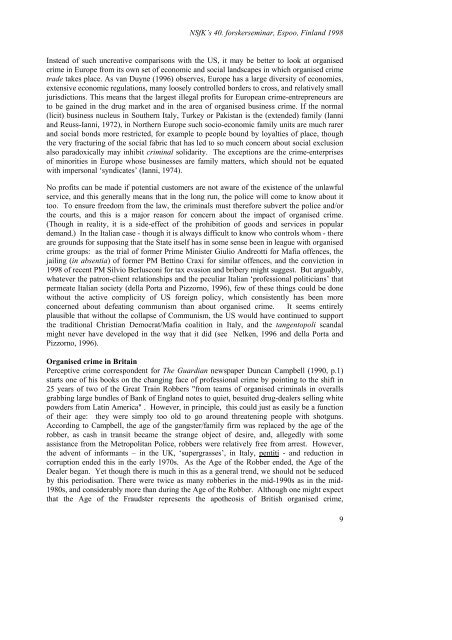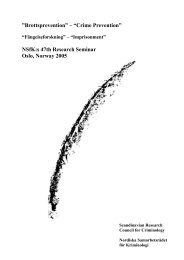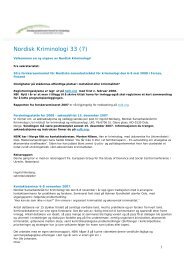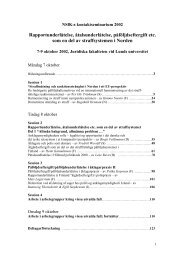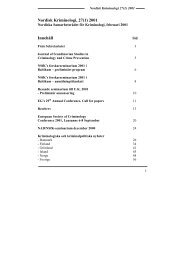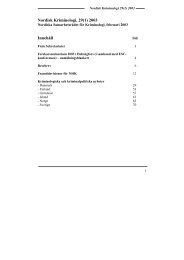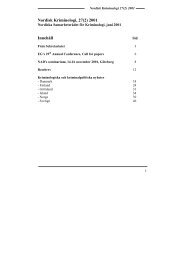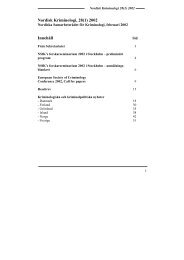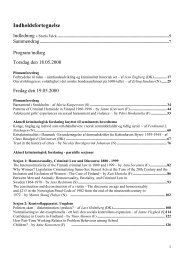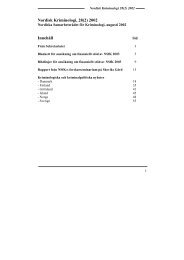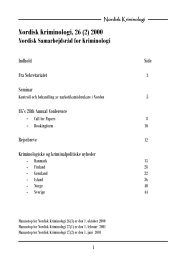Organised Crime & Crime Prevention - what works? - Scandinavian ...
Organised Crime & Crime Prevention - what works? - Scandinavian ...
Organised Crime & Crime Prevention - what works? - Scandinavian ...
You also want an ePaper? Increase the reach of your titles
YUMPU automatically turns print PDFs into web optimized ePapers that Google loves.
NSfK’s 40. forskerseminar, Espoo, Finland 1998<br />
Instead of such uncreative comparisons with the US, it may be better to look at organised<br />
crime in Europe from its own set of economic and social landscapes in which organised crime<br />
trade takes place. As van Duyne (1996) observes, Europe has a large diversity of economies,<br />
extensive economic regulations, many loosely controlled borders to cross, and relatively small<br />
jurisdictions. This means that the largest illegal profits for European crime-entrepreneurs are<br />
to be gained in the drug market and in the area of organised business crime. If the normal<br />
(licit) business nucleus in Southern Italy, Turkey or Pakistan is the (extended) family (Ianni<br />
and Reuss-Ianni, 1972), in Northern Europe such socio-economic family units are much rarer<br />
and social bonds more restricted, for example to people bound by loyalties of place, though<br />
the very fracturing of the social fabric that has led to so much concern about social exclusion<br />
also paradoxically may inhibit criminal solidarity. The exceptions are the crime-enterprises<br />
of minorities in Europe whose businesses are family matters, which should not be equated<br />
with impersonal ‘syndicates’ (Ianni, 1974).<br />
No profits can be made if potential customers are not aware of the existence of the unlawful<br />
service, and this generally means that in the long run, the police will come to know about it<br />
too. To ensure freedom from the law, the criminals must therefore subvert the police and/or<br />
the courts, and this is a major reason for concern about the impact of organised crime.<br />
(Though in reality, it is a side-effect of the prohibition of goods and services in popular<br />
demand.) In the Italian case - though it is always difficult to know who controls whom - there<br />
are grounds for supposing that the State itself has in some sense been in league with organised<br />
crime groups: as the trial of former Prime Minister Giulio Andreotti for Mafia offences, the<br />
jailing (in absentia) of former PM Bettino Craxi for similar offences, and the conviction in<br />
1998 of recent PM Silvio Berlusconi for tax evasion and bribery might suggest. But arguably,<br />
<strong>what</strong>ever the patron-client relationships and the peculiar Italian ‘professional politicians’ that<br />
permeate Italian society (della Porta and Pizzorno, 1996), few of these things could be done<br />
without the active complicity of US foreign policy, which consistently has been more<br />
concerned about defeating communism than about organised crime. It seems entirely<br />
plausible that without the collapse of Communism, the US would have continued to support<br />
the traditional Christian Democrat/Mafia coalition in Italy, and the tangentopoli scandal<br />
might never have developed in the way that it did (see Nelken, 1996 and della Porta and<br />
Pizzorno, 1996).<br />
<strong>Organised</strong> crime in Britain<br />
Perceptive crime correspondent for The Guardian newspaper Duncan Campbell (1990, p.1)<br />
starts one of his books on the changing face of professional crime by pointing to the shift in<br />
25 years of two of the Great Train Robbers "from teams of organised criminals in overalls<br />
grabbing large bundles of Bank of England notes to quiet, besuited drug-dealers selling white<br />
powders from Latin America" . However, in principle, this could just as easily be a function<br />
of their age: they were simply too old to go around threatening people with shotguns.<br />
According to Campbell, the age of the gangster/family firm was replaced by the age of the<br />
robber, as cash in transit became the strange object of desire, and, allegedly with some<br />
assistance from the Metropolitan Police, robbers were relatively free from arrest. However,<br />
the advent of informants – in the UK, ‘supergrasses’, in Italy, pentiti - and reduction in<br />
corruption ended this in the early 1970s. As the Age of the Robber ended, the Age of the<br />
Dealer began. Yet though there is much in this as a general trend, we should not be seduced<br />
by this periodisation. There were twice as many robberies in the mid-1990s as in the mid-<br />
1980s, and considerably more than during the Age of the Robber. Although one might expect<br />
that the Age of the Fraudster represents the apotheosis of British organised crime,<br />
9


